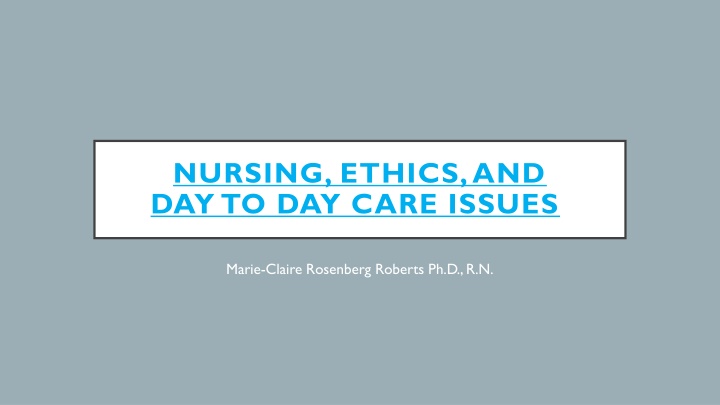
Nursing: Ethics, Care Issues, and Practice Overview
Explore the comprehensive guide on nursing, including definitions, roles, and the nursing process. Learn about the art and science of nursing, ethical dilemmas, and day-to-day care issues. Discover the core principles, duties, and responsibilities of nurses in providing holistic care to individuals across various settings.
Download Presentation

Please find below an Image/Link to download the presentation.
The content on the website is provided AS IS for your information and personal use only. It may not be sold, licensed, or shared on other websites without obtaining consent from the author. If you encounter any issues during the download, it is possible that the publisher has removed the file from their server.
You are allowed to download the files provided on this website for personal or commercial use, subject to the condition that they are used lawfully. All files are the property of their respective owners.
The content on the website is provided AS IS for your information and personal use only. It may not be sold, licensed, or shared on other websites without obtaining consent from the author.
E N D
Presentation Transcript
NURSING, ETHICS, AND DAY TO DAY CARE ISSUES Marie-Claire Rosenberg Roberts Ph.D., R.N.
TODAYS SESSION Definitions What is nursing? What do nurses do? History: Caring Corrupted Nursing dilemmas
DEFINITION OF NURSING Definition of Nursing (Short version) Nursing encompasses autonomous and collaborative care of individuals of all ages, families, groups and communities, sick or well and in all settings. Nursing includes the promotion of health, prevention of illness, and the care of ill, disabled and dying people. Advocacy,promotion of a safe environment, research, participation in shaping health policy and in patient and health systems management, and education are also key nursing roles. Definition of a Nurse: The nurse is a person who has completed a program of basic, generalized nursing education and is authorized by the appropriate regulatory authority to practice nursing in his/her country. Basic nursing education is a formally recognized program of study providing a broad and sound foundation in the behavioral, life, and nursing sciences for the general practice of nursing, for a leadership role, and for post-basic education for specialty or advanced nursing practice. The nurse is prepared and authorized (1) to engage in the general scope of nursing practice, including the promotion of health, prevention of illness, and care of physically ill, mentally ill, and disabled people of all ages and in all health care and other community settings; (2) to carry out health care teaching; (3) to participate fully as a member of the health care team; (4) to supervise and train nursing and health care auxiliaries; and (5) to be involved in research. Source: International Council of Nurses http://www.icn.ch/who-we-are/icn-definition-of-nursing/ (Accessed July 2018)
WHAT IS NURSING? Nursing can be described as both an art and a science; a heart and a mind. At its heart, lies a fundamental respect for human dignity and an intuition for a patient s needs. This is supported by the mind, in the form of rigorous core learning. Due to the vast range of specialisms and complex skills in the nursing profession, each nurse will have specific strengths, passions and expertise. Nursing has a unifying ethos: In assessing a patient, nurses do not just consider test results. Through the critical thinking exemplified in the nursing process, nurses use their judgment to integrate objective data with subjective experience of a patient s biological, physical and behavioral needs. This ensures that every patient, from city hospital to community health center; state prison to summer camp, receives the best possible care regardless of who they are, or where they may be. Source: https://www.nursingworld.org/practice-policy/workforce/what-is-nursing/ (Accessed July 2018)
NURSING PROCESS Assessment Nurses assess patients on an in-depth physiological, psychological, economic, social and lifestyle basis. Diagnosis Through careful consideration of both physical symptoms and patient behavior, the nurse forms a nursing diagnosis. Outcomes / Planning With patient input, nurses uses their expertise to set realistic goals for the patient s recovery. Implementation By accurately implementing the care plan, nurses guarantee consistency of care for the patient whilst meticulously documenting their progress. Evaluation By closely measuring, evaluating, and analyzing the effectiveness of each care plan, the nurse refines the plan to achieve the best patient outcomes.
INTERNATIONAL COUNCIL OF NURSES CODE OF ETHICS http://www.icn.ch/images/stories/documents/about/icncode_english.pdf
INTERNATIONAL COUNCIL OF NURSES CODE OF ETHICS
EVERYDAY ETHICAL DILEMMAS What are the principles and criteria you will use to make a decisions about allocating your time? How much time per patient and when? 1. Patient No. 1: Mr. M, a 42 years old male with 3 children, has just been told that he has terminal cancer - a matter of days maybe weeks. Patient No. 2: Ms. J, a 36 year old female, Day 1 post-op with a drain placed in the surgical incision (reading: 400 ml of blood). Her blood pressure is 87/65. Patient No. 3: Mr. K is an 87 year old man with post-operative delirium (hip surgery) and keeps asking to get up to use the toilet. Patient No. 4: Mrs. P is a 57 year old you is on a ventilator. His tube needs to be suctioned. 2. 3. 4.
PRINCIPLES Allocative justice Justice states that people should be treated fairly and equally. (Guido, 2014 p.38) Ideally, justice means giving each person what he or she deserves. (Guido, 2014 p.38)
CRITERIA Medical urgency / emergency Assessment / re-assessment Physical vs. psychological Needs assessment and prioritization Resources available
CASE STUDY Minnie Jones, a 76-year-old white female, presented with severe hip pain after a fall in a shopping mall. Alert and oriented, she cooperated fully in all diagnostic tests and care while in the emergency department (ED). However, when the physician told her the diagnosis - fractured hip - she refused to allow further treatment and demanded she be allowed to die with dignity. After attempting to persuade for the better part of an hour, the ED physician called her oldest son for permission to treat her. The son was out of the country, but after a discussion with the physician, he gave permission for treatment. Nurse Caroline was told to give Mrs. Jones her preoperative medication. Flanked by a big orderly, she told Mrs. Jones her physician had ordered a sedative to be given to her before surgery. Mrs. Jones replied, I don t want to go to surgery. I ve heard all about how many people die from broken hips and I ve decided it s my time! The doctor said my son gave his permission, but my son has no right to speak for me. I said no, and I mean no. Leave me alone, and let me die in peace! When Caroline threatened to have the orderly physically restrain her, Mrs. Jones consented to the injection. Once Mrs. Jones dozed off, the nurse sent her to the operating room without a signed consent form, but with notations that her son had been contacted and had given verbal permission for the surgery. Mrs. Jones made it through surgery with flying colors, but developed pneumonia postoperatively and was put on a ventilator. She didn t respond to various antibiotics and became disoriented. Her son returned from vacation to find his mother in the intensive care unit with a poor prognosis. Angry and threatening to sue, he said he never would have consented to surgery if he d known about the complications. Source: https://www.americannursetoday.com/case-study-coerced-consent/ Accessed 09.24.17






















